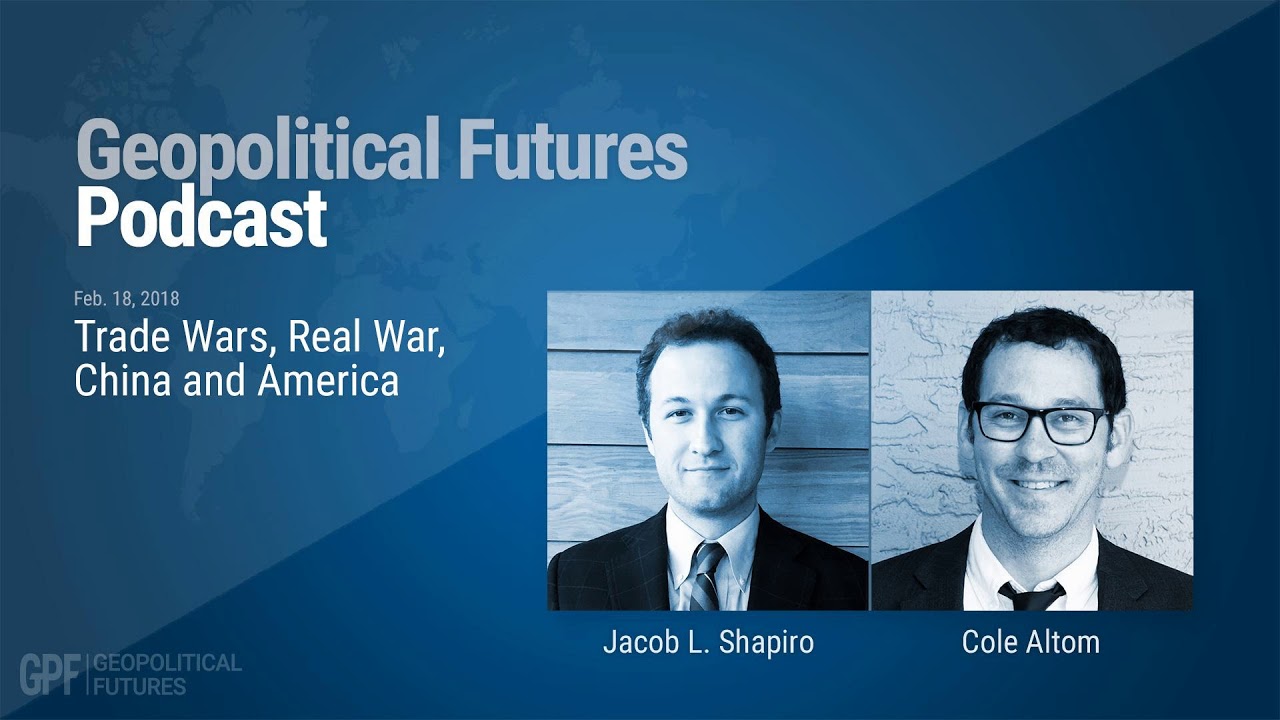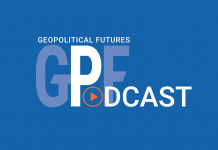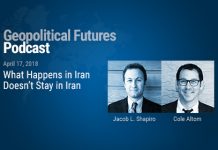Jacob L. Shapiro: Hello everyone, welcome to another Geopolitical Futures podcast, I’m Jacob Shapiro and it’s a beautiful Sunday here in Austin, Texas. I’m joined by Cole Altom. How’s it going Cole?
Cole Altom: Good. Third time’s the charm I guess and if I can be so bold, I’d like to dedicate my performance this week to a reader out there. Shout out to whoever he or she is that called attention to my extra, extra, extra large ears. Joke’s on them, they are only like extra, extra-large.
JLS: Ears fit for radio.
CA: That is very true. We couldn’t find headphones big enough. So we’re just flying by the seat of our pants really. Well thank you for that introduction. Let’s get on with the show. Week ahead, what do you got for me?
JLS: Well the first thing is that the Middle East is just a mess right now. There’s a lot of stuff going on.
CA: It didn’t get solved in the past week?
JLS: It didn’t get solved over the weekend, no it’s still the Middle East. But so on Friday, Rex Tillerson was in Turkey running around to a bunch of meetings and it seems like the United States and Turkey have come to some kind of agreement. It’s not really clear what that looks like but relations there were on the verge of breaking and they’ve gone back from the precipice.
So we’ll have to see if the United States follows through and gets some of those Syrian Kurdish militias to pull back from their positions as they promised the Turks that they would before.
CA: What’s Russia going to do in the meantime? What are they thinking when they are looking at this right now?
JLS: I think Russia is in a difficult position because Russia was trying to build this, Russia has basically been trying to be friends with everyone in the Middle East and at a certain point, you can’t be friends with everyone.
CA: No.
JLS: You know, Russia has been closest to Iran but as Iran pushes forward, Iran is creating enemies all across the region and Russia has to calibrate and see if it can pull Iran back, just how far it wants Iran to push so that it can take advantage of the situation.
CA: Ok, what else?
JLS: Second, we’ve got you know a close eye on Germany. There’s gonna be a vote among the coalition parties that are going to make up the new German coalition about whether they actually want to join the coalition. That voting I believe starts next week and goes until March 4. But you can already see some confidence coming out of Angela Merkel for the first time in six or seven months, you see some movement to start thinking about next steps for the EU because Europe has basically been in a bit of a holding pattern while Germany tries to figure out itself.
So I think, watch Germany not because the coalition vote is going to be decided this next week but polls right now look pretty good in these parties for joining the coalition and I think you’re going to start to see Germany start to warm up, start thinking about what comes next as their government gets installed.
And then last but not least, a close eye on U.S.-Mexico relations. There was a report at the end of last week that said Pena Nieto and Donald Trump were going to have a meeting at some point and that it was going to be announced soon. There has yet been no announcement but there’s a lot of stuff going on right now between Mexico and the United States related to NAFTA, related to violence in Mexico, related to Central American refugees coming up through Mexico to the U.S. border. For all of these reasons, also Mexican elections coming up, that particular meeting and what’s going to be discussed there is I think going to be particularly important.
CA: Ok great, thanks very much. Now we’ve got a piece coming out here pretty soon about new developments in this budding U.S.-China trade war that we keep hearing so much about. And that’s all good and well but I don’t want to talk so much about trade wars, I want to talk about real wars. I want to talk about the good stuff, right? And so specifically, there was this just delightful article I believe it was last week from the Global Times.
Now for the uninitiated, the Global Times is a wonderful publication out of China and we contextualize this a little bit. It’s published by the People’s Daily which is the official mouthpiece of the Communist Party of China. But it’s sort of branded as this thing where you can find normal things in there, you can find sports and celebrity gossip and all these other things. But when it comes to its opinion pages and when it comes to foreign policy, it is very, very, very loud. It is very in your face. Some might say militaristic, very nationalistic. It rattles a lot of sabers. Is that fair characterization so far?
JLS: It is. I mean I think it’s one of the places where China expresses some of the things that isn’t necessarily polite to express. So sometimes the things in Global Times are accurate, sometimes they’re not. Sometimes they’re somewhere in between. But when you read the Global Times, you’re not reading it to know exactly what’s happening, you’re reading it to know well what does that fringe or what does that side of the equation think about what’s going on.
CA: Right, so it’s fair to say that you know fringe though it might be, it is still representative of at least some corner of the ruling party, right? So and that’s kinda what I want to talk to you about. Before we get into it though, I guess we need to take a step back. And if we’re talking about Chinese military doctrine or Chinese military development in any sort of capacity. I think it’s wise first to step back and say what is China’s strategy right now? What is the strategy it aspires to have?
JLS: Well it’s a complicated question.
CA: I know!
JLS: But so there are a couple different things here. In terms of what China wants to do right now, China is really focusing on building what we would call area denial capabilities.
CA: What does that mean?
JLS: So China wants to make it very difficult for a hypothetical attacker, like say the United States, to actually attack China. China doesn’t have the ability to resist the U.S. Navy. But what China is doing right now is it’s trying to build the capability so that if the U.S. and China ever came into conflict, China would be able to inflict a very heavy price on the United States.
CA: So it’s less about projecting power outward and more about defensive capabilities? Does that make sense?
JLS: Well it’s more about defensive capabilities right now because they simply don’t have the offensive capabilities. Now the next step to that is once you have defended the border and can make it more difficult for an enemy to attack you, then you want to try to start pushing outwards. Now when you look at where China is investing its money, a lot of it is going into the Navy and into specific capabilities.
What they’re trying to do is they’re basically circumscribed by this first island chain if you want, this chain of U.S. allies who surround them and China is trying to build the capabilities in order to resist. So this means a lot of you know more local ships. Also think about things like amphibious landings. Think about you know getting experience with carrier battlegroup operations because China has never really done that before. One of my favorite things to point out is that I think China has only graduated two or three class of fighter pilots who actually have any experience flying planes on and off carriers.
CA: Well and bear in mind too, they do have an aircraft carrier but it’s an old Soviet model if I’m not mistaken and they only recently got it, so it’s not like having one all of the sudden makes you a perfectly superior blue-water navy.
JLS: No well they refurbished one and there’s an indigenous one…
CA: Is there?
JLS: that is being built and there’s even a third one. And the third one is going to have more advanced technology. So the first two have these ramps that the jets go up the ramp and they go off. A U.S. carrier actually sort of shoots the fighters off with some sort of catapult type thing.
CA: It’s like a sling shot.
JLS: That third carrier that China is working on, this is going to be completed many years down the line, reportedly has some sort of that more advanced technology. So you know China is definitely thinking in terms of building those forced projection ships. But even when you look at Chinese press or what Xi Jinping has said himself, they’re thinking about 2030, 2040 for that kind of stuff.
What they’re focusing right now is some of the more mundane, protecting the border. If hypothetically they ever wanted to go for Taiwan, you would need amphibious landing ships to get your soldiers from China to the island of Taiwan. They don’t actually have that. They don’t have the capability to just put as many soldiers as they want there.
So you know you can talk about carriers and all these global blue-water navy projection things they’re trying to do. But if you want to see what’s really important, look at you know mines and anti-mines and submarines and the advances they’re making there, that’s the real important spot right now.
CA: Well and to take it back to the article then, the Global Times article we were speaking about a moment ago, different factions in the government there and I believe correct me if I’m wrong, President Xi himself, have always kind of maintained the line that its military development, its overhaul is a slow deliberate maturation. A thing that is done peacefully, that any burgeoning power would ordinarily have. Not everybody agrees with that, right? Not everybody in China actually agrees with that.
So some are saying that this is designed specifically to counter the United States or to challenge the United States or undermine it in some way. Still many in the government are saying no, not at all this is just for peaceful purposes. Can you sort of explain that divide and where some of these camps align or unalign?
JLS: Yeah I can explain the divide and then I’ll tell you why I think it’s not important.
CA: Ok.
JLS: Because the divide is that you’re exactly right, if you go to different conferences or listen to different Chinese officials talk, they will emphasize China’s peaceful rise. This is definitely not true and has not been true throughout all of China’s history. There are some that want to get a lot more aggressive but it really doesn’t matter what they want. As China’s power increases, its interests are going to change. They’ve already changed somewhat and that means that the U.S. and China are not going to see eye to eye.
Right now, China is ok with the U.S.-led global economic system and you know the global trade routes being protected by the United States. But as China gets more powerful and becomes more of a competitor to the United States, it wants to be able to control some of those sea lanes itself. So whether someone in China says they want a peaceful rise or not, just the sort of elemental progression of China’s power brings it into, not into conflict, but into disagreement with the United States and that will create a whole set of different things.
I don’t think that anyone in Germany in the 1870s was like yeah we’re going to take over Europe, right? It was the natural rise of a united Germany that sort of created these policy conditions that eventually brought Germany into conflict with France, the U.K., Russia.
CA: Not to look too far into it but do you think that’s a fair comparison, contemporary China and late 19th century Germany?
JLS: They’re all comparisons, there are some things that are similar and there are some things that are completely different. Germany and the United Kingdom were basically in the same continent. The United States and China are not. For Germany and the United Kingdom, there was also, some of it basically became zero-sum in large part because of the political relationships that developed in Europe. I don’t think it is that way quite yet.
But if you’re talking about you have one power that is very, very strong and firmly entrenched, the United States, and you have up-and-coming power like China. Yeah you do have a very well entrenched power and an up-and-coming power.
CA: Well let’s go back to China then. If there are factions that are at least saying these things, even if they are not able to do them, but if they’re actually saying them. You know this is not just a matter of, to some degree it’s not the same thing as some different dissenting opinions in today’s Republican party or Democratic party. This is the Communist party of China and Xi Jinping is essentially their Chairman, right?
So, to what extent is he allowing this conversation to be had if at all? Or if he has any say in that, one? Two, do these factions, if they are actually rogue and not operating at his express approval, do they pose any sort of challenge to his reign? Explain some of the purges and some of the reshuffling that he’s done over the years to sort of entrench himself and appoint people who are loyal to him.
JLS: Look one of the most impressive things about Xi Jinping is the way that he has gone about reforming the PLA, the People’s Liberation Army. He has done some major work here. They’ve reorganized from I think it was seven different administrative regions to five. He reshuffled commanders. He took commanders from one region where they had a power base and put them in another place where they didn’t necessarily have a power base. He laid off hundreds of thousands of soldiers at one point. There have been a lot of changes in the PLA under Xi’s rule.
Xi has also anointed himself basically the “commander in chief,” which was never really a role that previous Chinese leaders played, it wasn’t like the United States, where the president is also the commander in chief of the armed forces. Xi talks about himself that way.
So you know when I look at China, I think that Xi’s position is fairly strong. I think he’s certainly the strongest Chinese leader we’ve seen since Deng Xiaoping and then Mao before him and I think his ability to control the military is very important with that. So I don’t think any of these discussions are happening without Xi being apart of it. Xi probably also knows that he has these different factions in the military and both of those have to be let out and have to have some kind of expression.
Just the conversation though, just the fact that that conversation is happening, openly in Chinese press, to me tells you that this is probably a live discussion in China and they are thinking both about how to make their rise peaceful because I don’t think that most countries ever want conflict. But are also preparing for the contingencies because they see geopolitically you know when rising powers come up against entrenched powers and the interests start to diverge that you have to be ready for conflict.
So the fact that China is having that conversation with itself tells you that it’s going through a maturation process. And how Xi’s military reforms go and how it goes in streamlining you know PLA operations is going to be important to watch and an important gauge of his power over time.
CA: I think my last question for you and we’ve been tiptoeing around it for a while, but I want to be a little bit more explicit if we can. There is absolutely a narrative and I kind of hate this word but there is a narrative out there and someone’s gonna call it a narrative, where the United States is beginning its slow, steady decline into obscurity and it’s going to be replaced by this rising power called China. It’s across the Pacific Ocean and it’s taking everybody by surprise.
I’m being a little facetious obviously because I know what our stance on this but I do want you to articulate that stance a little bit because that is a very, very convenient narrative and it’s pretty accurate but only up until a point.
JLS: Well look the forecast that we have is that China is definitely going to get stronger here over the course of the next five, ten maybe even fifteen years. But then there are just certain internal inconsistencies in China that have asserted themselves throughout Chinese history in many iterations that the People’s Republic will also fall too.
CA: Can you give me a for instance?
JLS: Well I mean the creation of the People’s Republic of China is a good for instance in itself. After the Qing empire collapsed, China basically went into civil war, was ruled by a bunch of different warlords from different regions. Out of that came sort of this nationalists versus the communists. They fought one mega civil war.
CA: Who won?
JLS: Well the Communists did.
CA: Oh no.
JLS: You know but that also became part of World War II, all these other things. Now I say all that and I will tell you and I can’t say this in writing, but I can say this because you’re listening and because you’re here.
CA: I’m listening to you.
JLS: This is the forecast I lose the most sleep over. And you know when I speak publicly and when people talk to me one on one, people ask me what is the forecast that you are least sure about at GPF? It’s this one about China. Because on the one hand, while I’ll see Chinese history and I see that there is a pattern to it and that this current cycle of strengthening fits into that pattern, I also see that the People’s Republic of China has done awesome things. And I don’t mean awesome in the millennial, cool sense.
CA: No, it’s hard to overstate the night and day difference between China you know 40 years ago and China today, it’s pretty remarkable.
JLS: It is and I mean it’s just one example, the piece you mentioned earlier that published today. I was looking at steel production figures for China. In 1967, China produced something like 2 percent of the world’s steel, today it’s like 50 percent. That’s shocking especially when you consider the level of poverty, the level of well I shouldn’t say the level, the lack of development in China. The amount of damage Mao did and some of the policies that he undertook and the patience of the Chinese people to go along with that.
So you know we have this forecast of China. I think it’s probably well known by most of our readers and most of our listeners. But if I think about what if we’re wrong about China, then yeah it does kinda look like that situation where eventually China is going to have to push back against the United States. Our take right now is that China is going to be beset with internal problems before it gets to that point. And that China is not going to be able to outrun or overcome those internal, domestic problems.
CA: Alright well you heard it here first. No conflict ever with China and the United States ever and I’m going to quote you on that one.
JLS: Unless we’re wrong in which case…
CA: Oh right in that case then everything we just said for the past few minutes is out the window.
JLS: No and I will say that there might be conflict. But I would just say that it’s not, at the end of the day I don’t think that that metaphor of the U.K. and Germany right and China and the U.S. being the main players in some kind of World War III is going to be…
CA: Well we mean a qualified conflict too because I mean any two large powers who have interests that butt up against each other are going to start feeling each other out. They’re going to push the boundaries and we’re seeing that right now. But in terms of all-out military confrontation, those are two very different things and we need to keep that in mind when we think about China going forward.
JLS: They are and the one thing I’ll add on at the end that I meant to say before and forgot to say is that you know China, also in Russia and a lot of these places in the world, they use the word multipolarity to describe their view of the world. That is to say that there isn’t a unipolar world, there isn’t just one overwhelming superpower, the United States. But China is rising and Russia is a significant power and there’s all these other significant powers and there’s not going to be one power center.
I would say that you know going forward, a multipolar world doesn’t mean that the U.S. is getting weaker. It means that other countries in the world are actually getting stronger. And to your point when people think about the relationship, they assume that the U.S. is just standing still and that China is going to be making these leaps and bounds improvements. The U.S. spends more on its military than a lot of other countries combined. The U.S. is still an economic, technological center of power that is really unmatched in the world.
So as China is going to grow and even if we’re wrong about China, the gap between the United States and China is still going to be there. And certainly you might have, you know, countries in the world like China, maybe like Japan, I don’t know it sort of depends on how things go, that are, maybe Turkey which we were talking about earlier in which the U.S. was having some serious disagreements with and still does not willing to put that to bed but you know those are some of the questions.
I think of this more in terms of the United States is not declining, the United States is going through a particularly volatile period right now. But the United States is not declining. China is advancing, we’ll see if it continues going. I think not.
CA: I think that’s a great point too. It’s a bit remiss of us to talk so much about China and just not even talk about the United States concurrently. But you need to, right? And for all these things to happen for China to become a number one power in the entire world, it has to stay on the path that its on and completely resolve all of its internal issues and meanwhile the United States has to keep on doing what it’s doing and also screw up in a bunch of horrible ways that you know may not even happen. So it’s not a zero-sum game like it was you know in Germany in the late 19th century, right?
JLS: Look and just read Xi Jinping’s own comments very closely yourself and you’ll see that China has some self-awareness of this just to bring it back to where we started. China is working on its first indigenous aircraft carrier. China is working on having enough amphibious landing ships so that if it wanted to, it could even contemplate invading a place like Taiwan. China is focusing on area denial. China is focusing on bringing the 100 million people who are living in the interior who are still living in abject poverty into some of form of wealth.
These are the problems that China is going to be dealing with in the next ten years. If they can and I have my doubts about I think these might be the problems that finally do them in. If they can, then in 10 years from now, you and I have to have another podcast and I have to say ok the GPF forecast was wrong, here we go and things might be a little different. But from where I sit right now and where I’m focusing on what China is for the next 10, 15 years, it’s you know very small, boring things about well how silent are their submarines, how good is their stealth technology, how good are their officer training schools? And, are there still 100 million people living on two dollars a day in the interior?
Those are the operative questions to be asking about China right now. And if you are a China bull that means you think China is going to overcome those things and I don’t discount that. I’ve seen what China has done over the course of the last 70, 80 years. They’ve blown away I think most projections. The flipside is that eventually geography I think will come home and will assert itself. And when it does, you know, we’ve seen similar historical patterns that doesn’t usually lead to China clashing with far away empires or nations.
CA: Alright well I wrote all those questions down and I’ll see you in 10 years.
JLS: Sounds great.
CA: Alright, thanks for taking the time, I appreciate it and we’ll catch y’all in 2028, right?
JLS: Sounds good.







 Special Collection – The Middle East
Special Collection – The Middle East